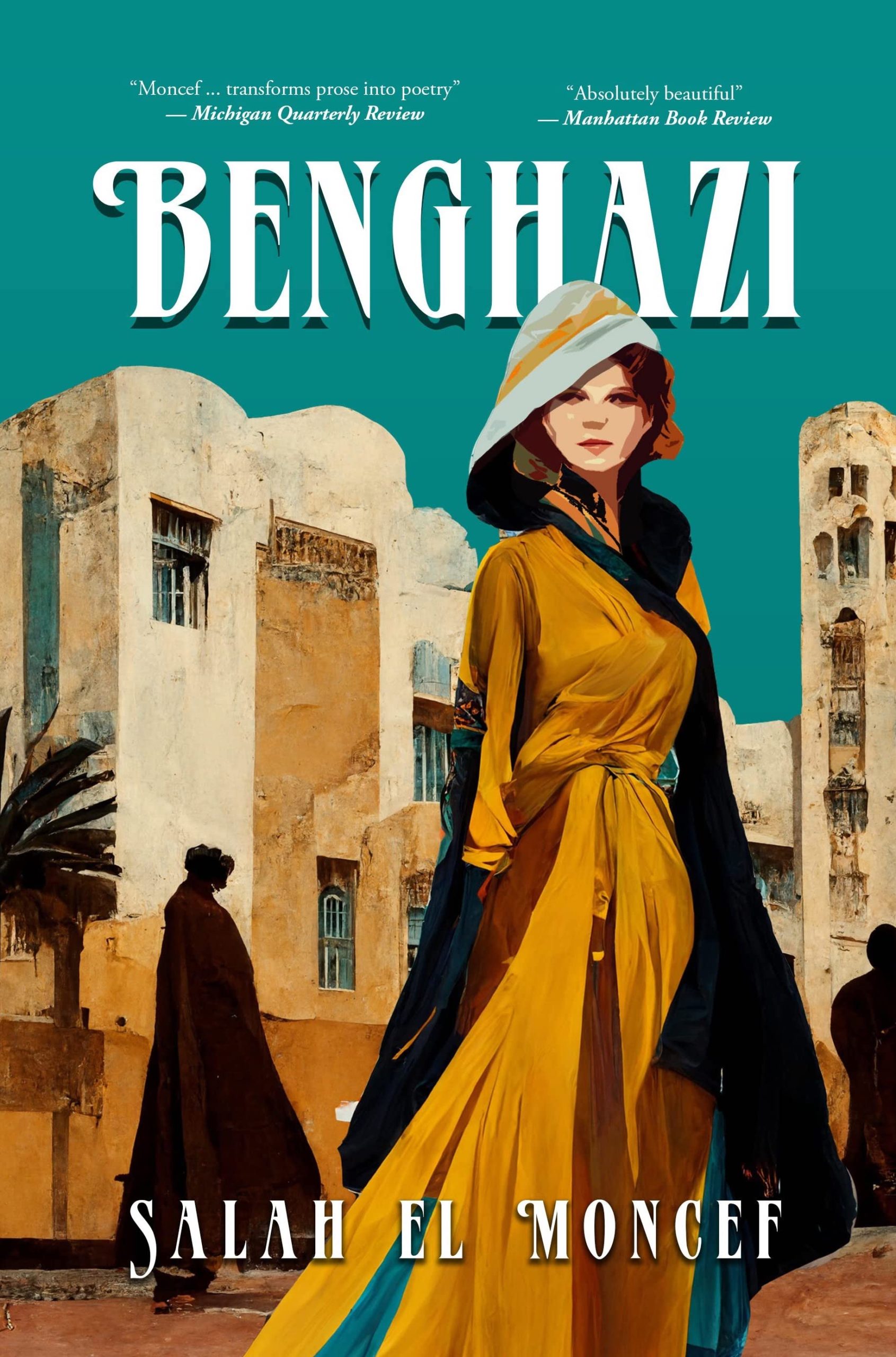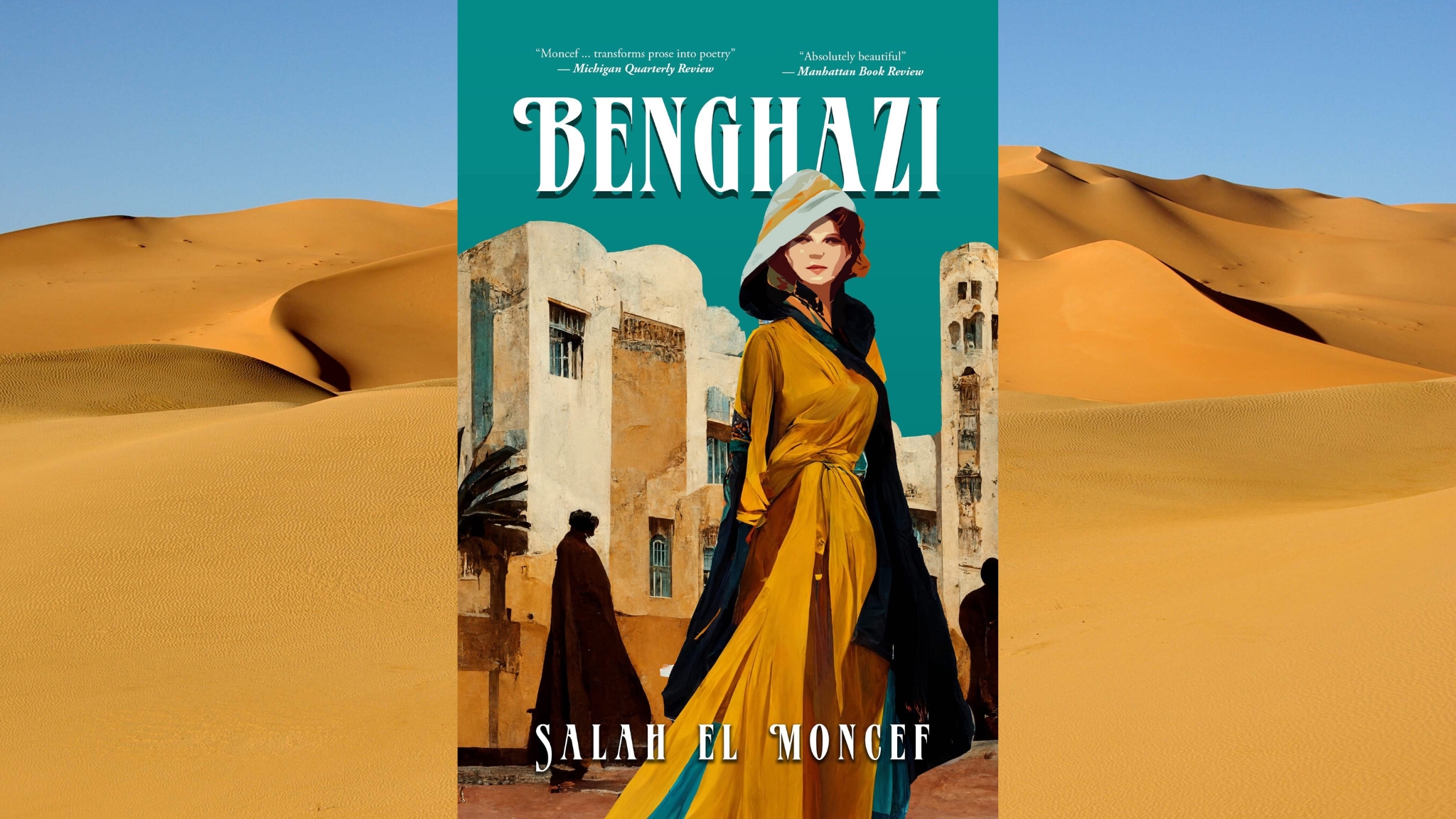Benghazi by Salah El Moncef
What's It About?
A fictionalized version of Mussolini's fascist reign, told from the perspective of a young Libyan girl whose family is forever changed by the presence of this oppressive patriarchal rule.On the cusp of the Second World War, Mussolini held Libya in the grips of his fascist rule. His dictatorship aimed to colonize the country which sustained anti-capitalist and anti-fascist sentiments. Salah El Moncef’s Benghazi (Penelope Books) is a fictionalized version of this historical event, told from the perspective of a young Libyan girl whose family is forever changed by the presence of this oppressive patriarchal rule.
Based on Real Historical Events
The Khaldoon family are Sufi Muslims, deeply loyal to the pacifism, love and tolerance of their faith. Naturally, Mussolini and everything he stands for contradicts those fundamental principles. But young Mariam — just entering double digits in 1937 when the majority of this novella takes place — doesn’t yet grasp the nuances of Mussolini’s presence in her life.
Mariam and her sister Zaynab attend “Mussolini school”, where they receive a fascist education under the guidance of Italian instructors and are indoctrinated into the idea of becoming “special Italian citizens”.
This greatly upsets their father, who was once a Revolutionary committed to fighting fascism in the footsteps of historical figure Omar Mukhtar. But throughout this turbulent time, Mr. Khaldoon is nothing more than a shadow lurking in the background of Mariam’s childhood. Her father’s absence is staggering and concerning — he holds a patriarchal rule over much of her life without ever seeing her, in a way that cleverly parallels Mussolini’s role in the story.
Because Benghazi is not told in sequential order, we learn of Mr. Khaldoon’s sudden death before we meet him on the page. Instead, the novella is written in bits and pieces of memory, jumping between timelines told in a memoir Mariam writes in 1970, recounting the early parts of her life. This novella is merely part one of her story.
Patriarchial Rule and an Absent Father
Mariam and her sister are chosen to greet Mussolini when he pays a visit to their school in Benghazi, leading the novella to a much-anticipated climax. Chosen likely for their fair complexions and ability to pass as Italians, and used as a subtle reprimand for their father’s political stances, the young girls are prepped and groomed to meet the Duce.
Mussolini’s presence only furthers this divide between the Khaldoon father and daughter — with Mr. Khaldoon’s inability to make an adult conflict understandable to a child, while Mariam vies for her father’s approval and is met with a dismissal she can’t comprehend.
Salah El Moncef has crafted a fascinating reflection on the cultural and historical influences that have shaped the way patriarchy plays a role in family dynamics. The novella is framed by a prologue, written by Professor Mari Ruti, which dives into a deep analysis of the role of patriarchy and the number of relevant symbolic moments the author has plotted. She says, “Moncef’s novella is about a girl’s attempt to navigate the treacherous terrain between love and fear, affection and remorse, in relation to her remote father.”
Striking Prose and Cultural Relevance
The void left by Mariam’s father is filled by the other people in her life, described in vivid and alluring detail. Salah El Moncef deftly captures this young woman’s fascination and curiosity about the adults in her life. This is particularly true for the women, who come and go throughout the short novella but manage to captivate Mariam’s attention as much as the readers’.
Benghazi is written in a way that makes it seem grander than its brief number of pages. From descriptions of the red Benghazi dust that settles on the characters’ clothes and causes them to sneeze, to the arrays of fruits at the local bazaar, to the physical characteristics of each person Mariam encounters, this novella played out like a short film.
Salah El Moncef has similarly created an honest and raw portrait of youth with Mariam. Looking out the window on a ride home, she suddenly feels for her mother, “A sad, sentimental urge to be alone with her in our house, to bury my face in the scented shadows of her coat, the protective embrace of her arms”. This masterful writer has an expert ability to capture the childlike innocence and the curiosity young people have about adult problems and emotions.
Moncef also successfully places readers in a time and place where the issues and urgency of the situation are tangible. Part one opens with 15-year-old Mariam being handed a gun by her brother Ali, assigned the task of protecting the family and keeping an eye out for danger as he embarks on his own journey.
By 1942, Benghazi had become a dangerous city under Mussolini’s fascist regime, and murder, kidnapping and burglary were not uncommon. As a result, the Khaldoon family has taken an anti-fascist and protective stance, as their Jewish neighbors are being deported and assumedly sent to concentration camps. In following their code of loyalty, as seen in their family business, they devote themselves to hiding the Jewish family and helping them escape the city. Moncef keeps this plotline open-ended, leaving readers with the haunting knowledge of the path history took, but an eagerness for more of Mariam’s story.
This novella comes at a particularly relevant point in time, where many of us — especially young women — are all too familiar with the waves of fascism, antisemitism and patriarchial influence over our daily lives. Benghazi reminds us of the importance of community in times like these when we must band together to protect those made most vulnerable by our political leaders and our society.
About Salah El Moncef:



 Salah El Moncef was born in Kuwait City, Kuwait. He is the author of Now and Then, Benghazi, Art as Pharmakon and the internationally acclaimed The Offering. His short fiction, largely focused on the Arab diaspora experience, has been published in numerous British and American magazines and anthologies. He is a five-time Fulbright scholar and a recipient of the Presidential Award for Excellence in the Humanities. Moncef is Reader in English and Creative Writing at Nantes University, France.
Salah El Moncef was born in Kuwait City, Kuwait. He is the author of Now and Then, Benghazi, Art as Pharmakon and the internationally acclaimed The Offering. His short fiction, largely focused on the Arab diaspora experience, has been published in numerous British and American magazines and anthologies. He is a five-time Fulbright scholar and a recipient of the Presidential Award for Excellence in the Humanities. Moncef is Reader in English and Creative Writing at Nantes University, France.

